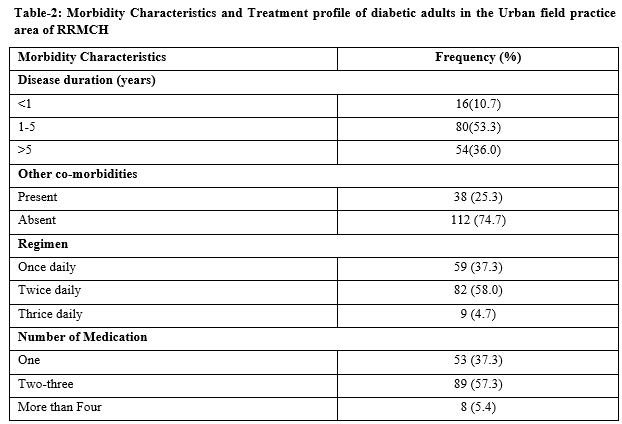Adherence to medications among adults with diabetes mellitus in the urban field practice area of a private medical college in Bangalore, Karnataka, India
Abstract
Introduction: Poor adherence is likely to lead to increased complications of diabetes resulting in increased costs of health care and increased morbidity and mortality for the population in the long term. The present study was designed to assess the socio-demographic profile and adherence to medications among adults with diabetes mellitus on treatment residing at urban field practice area of a private medical college in Bengaluru, Karnataka.
Materials & Methods: This was a cross-sectional study comprising of 150 adults with Diabetes Mellitus residing at Urban Field Practice Area of Raja Rajeswari Medical College and Hospital, Bangalore. Data entry was done in MS excel and analyzed in SPSS software.
Results: Out of 150 study subjects, it was observed that majority, 54 (36%) of the study subjects had disease duration of more than 5 years. High, moderate and low adherence to medication was found among25 (16.67%), 91 (60.67%) and 34 (22.66%) of the study subjects respectively. Low adherence was observed to be higher 20(58.8%) among study subjects with disease duration of more than 5 years as compared to other categories. Co-morbidity was absent in majority, 24 (70.6%) of the study subjects with low adherence.
Conclusion: It is evident that there is a great need on the part of health care providers to not only prescribe medications to the patients with diabetes mellitus but also make a conscious effort to address the issue of non-adherence to the prescribed medications and other non-pharmacological measures.
Downloads
References
2. Shukla P, Palta S, Gupta A, Sehgal VK. A study to evaluate compliance in patients of diabetes mellitus in a North-Indian tertiary care hospital. Int J Basic Clin Pharmacol 2018; 7(3):480-485. doi: http://dx.doi.org/10.18203/2319-2003.ijbcp20180661.
3. Ho PM1, Rumsfeld JS, Masoudi FA, McClure DL, Plomondon ME, Steiner JF, et al. Effect of medication nonadherence on hospitalization and mortality among patients with diabetes mellitus. Arch Intern Med. 2006;166(17):1836-1841. doi: 10.1001/archinte.166.17.1836.
4. Morisky DE1, Ang A, Krousel-Wood M, Ward HJ. Predictive validity of a medication adherence measure in an outpatient setting. J Clin Hypertens (Greenwich). 2008;10(5):348-354. doi: 10.1111/j.1751-7176.2008.07572.x.
5. Thekkur P, Reddy MM, Ramaswamy G, Naik BN, Lakshminarayanan S, Saya GK. Medication adherence and its correlates among diabetic and hypertensive patients seeking care from primary health center, India. Int J Curr Res Rev. 2015;7(21):33.
6. Arulmozhi S, Mahalakshmy T. Self care and medication adherence among type 2 diabetics in Puducherry, Southern India: A hospital based study. J Clinic Diagnos Res: JCDR. 2014;8(4):UC01-UC03. doi: 10.7860/JCDR/2014/7732.4256.
7. Sankar UV, Lipska K, Mini GK, Sarma PS, Thankappan KR. The adherence to medications in diabetic patients in rural Kerala, India. Asia Pac J Public Health. 2015;27(2):NP513-NP523. doi: 10.1177/1010539513475651. Epub 2013 Feb 14.
8. Shaimol T, Biju CR, Anilasree BP, Jayakrishnan SS, Babu G. Medication Adherence to Oral Hypoglycemic Agents in Type 2 Diabetic Patients. J Pharma Res Clinic Pract 2014;4(2):8-12.

Copyright (c) 2019 Author (s). Published by Siddharth Health Research and Social Welfare Society

This work is licensed under a Creative Commons Attribution 4.0 International License.


 OAI - Open Archives Initiative
OAI - Open Archives Initiative


